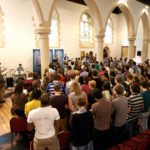Pew Research Center released an interesting study last week. The study looked at American’s attendance of religious services and respondents’ reasons for attending or not attending them.
Particularly enlightening was the section on why people who self-identify as religious (presumably, mostly Christian), don’t attend church. What keeps people who profess faith in Christ from attending church? The main answers surprised me, as I think they will most.
Why Christians don’t attend church
Awareness of people being “hurt by the church” seems to have arisen in Christian consciousness in the last few years.
Other than the perceived decline in general acceptance of Christian beliefs in America, no facet of church decline has received as much attention as bad experiences in a particular church causing people to stop attending church altogether. When I asked my Facebook friends to guess the most common reason Christians gave for not attending church, some version of this idea was one of the most common answers.
Despite the amount of attention given to this phenomenon, it wasn’t the top reason given in the survey. Of the eight options, bad church experiences was only the fourth most common, barely in the top half of the list, with 14% of Christians who do not attend church giving “hurt by the church” as a reason.
The most commonly given answer was “I practice my faith in other ways,” with the implication presumably being that the church does not factor into their life as a Christian.
Is neglecting church a problem?
In short, yes.
Congregations inadvertently making their churches an unwelcoming environment is a problem that has received due attention. Congregations not being able to justify their place in the Christian life is a (statistically) bigger problem that has received very little attention.
One of the few examinations of this phenomenon is an excellent book by Todd M. Brenneman titled Homespun Gospel: The Triumph of Sentimentality in Contemporary American Evangelicalism.
Sign up for our weekly edition and get all our headlines in your inbox on Thursdays
Brenneman argues that American Evangelicals, in line with contemporary trends in broader American culture, have become fixated on “spiritual therapy” and “self-help” as the summation of the Christian mission. This leads to an excessive focus on the individual relationship with God at the expense of the communal.
Think of the most popular Christian books of the last two decades: The Purpose Driven Life, Your Best Life Now, and The Prayer of Jabez. These books may not be entirely problematic in themselves but may lead to the idea that Christianity is primarily a private, internal affair and that the church exists to serve the private interest.
When the individual relationship with God becomes the primary concern of the church, we shouldn’t be surprised when people feel the church is optional and even superfluous to real faith.
A saved people and saved peoples
The Bible will not allow such individual focus, however. Jesus came to establish a saved community, and our salvation is a result of our being part of that community.
We are not saved by the church. Salvation is the work of Christ alone and relies on no institution. But the New Testament shows salvation as a corporate experience. Romans 11, the theological “climax” of Paul’s longest and most intricate letter, compares the offering of salvation to Gentiles as well as Jews to a branch being grafted onto a tree. The tree is the community of people who will be saved, and Gentiles are saved by being brought into this community.
I wrote a few weeks ago about expecting God to be present in a unique way in the worship service, a way God is not present in any other place. The Bible tells us to expect this, for though God is omnipresent, the Bible states, “where two or three are gathered in my name, there I am with them.”
The church as a relevant and necessary community
If Pew’s data is reliable, churches must do a better job of recognizing their role in God’s saving work and the unique encounter with God that takes place in the church. People who experience God only outside of the church are missing out on the fullest experience of God promised to us.
I’ll end with a line from Karl Barth, which has stuck with me and came to mind when I read the Pew study: “God may speak to us through Russian Communism, a flute concerto, a blossoming shrub or a dead dog. We do well to listen to him if he really does … However, the church known to us has a special commission.”
Rising awareness of how the church has hurt people shows the American church has regained a helpful sense of humility lost somewhere in the American church’s period of cultural dominance. We are more aware now how the church is an institution susceptible to failings.
At the same time, we can’t let the pendulum swing too far to the other side. The church offers the world something unique and irreplaceable. People may encounter God in their backyard, but they are still missing something that happens only in the church. Let’s not let our recovery of healthy humility overshadow the fact we have something unique to offer the world—a space where God is present in a way unlike anywhere else.
Jake Raabe is a student at Baylor University’s George W. Truett Theological Seminary in Waco, Texas. He is also a co-founder of Patristica Press, a Waco-based publishing house.














We seek to connect God’s story and God’s people around the world. To learn more about God’s story, click here.
Send comments and feedback to Eric Black, our editor. For comments to be published, please specify “letter to the editor.” Maximum length for publication is 300 words.